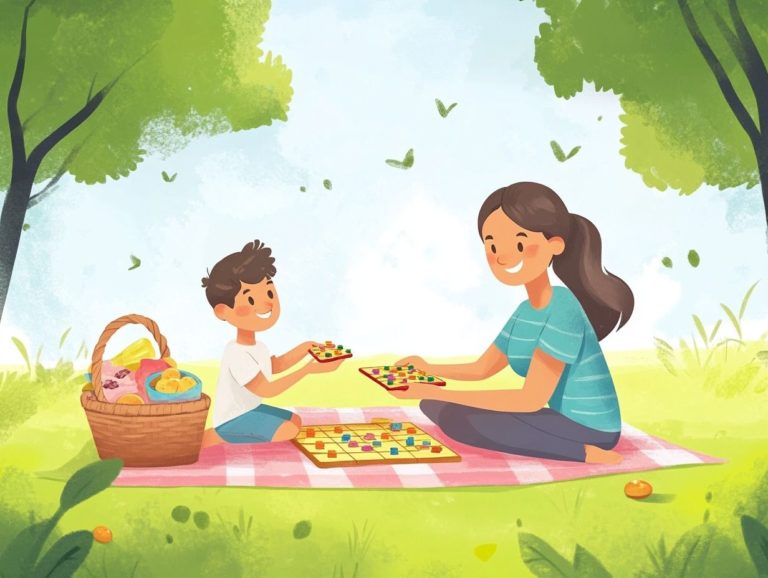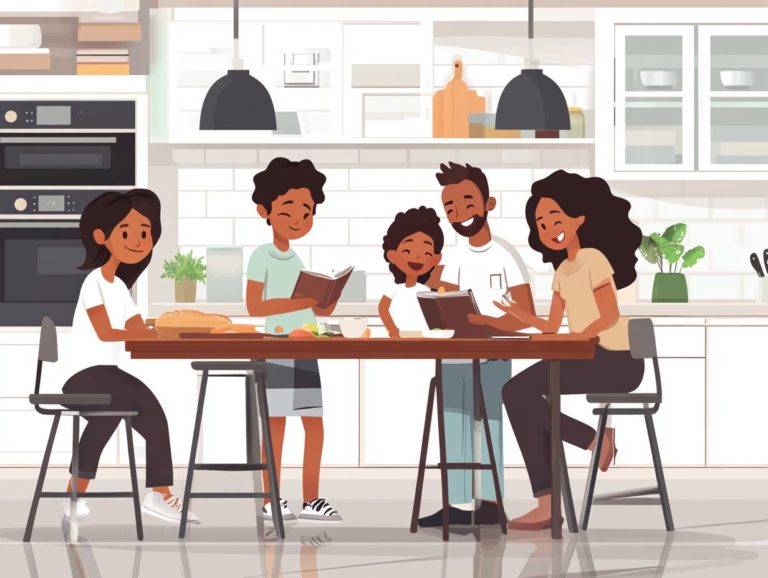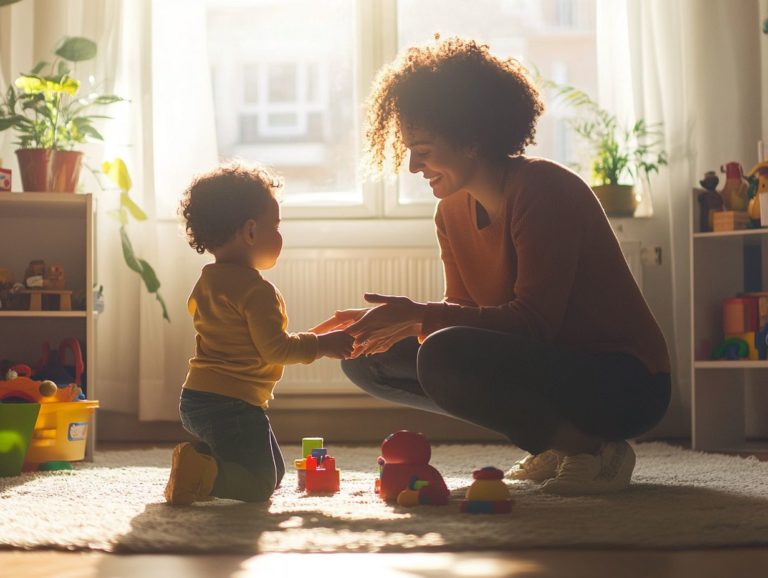The Importance of Creating Family Rituals
Family rituals transcend mere traditions; they are profound practices that enhance connections, forge lasting memories, and instill a sense of stability within your home. From family dinners to birthdays, Christmas, and even cultural festivals like Ramadan and Diwali, these rituals shape our lives.
This article delves into the essence of family rituals, exploring their significance and guiding you on how to create your own. It also presents inspiring examples and emphasizes the myriad benefits these rituals can bring to your family life, including stronger family relationships, psychological health, and academic achievement.
Uncover how even the simplest moments, like a bedtime story or a foot massage, can transform family dynamics and deepen relationships, enriching the tapestry of your shared experiences.
Contents
- Key Takeaways
- What Are Family Rituals?
- How To Create Family Rituals?
- What Are Some Examples of Family Rituals?
- Creating Family Rituals
- What Are The Benefits of Family Rituals?
- What are family rituals and why are they important?
- How do family rituals benefit children?
- Can family rituals help improve communication within the family?
- What are some examples of family rituals?
- How can families create and maintain rituals?
- Can family rituals help build resilience?
Key Takeaways
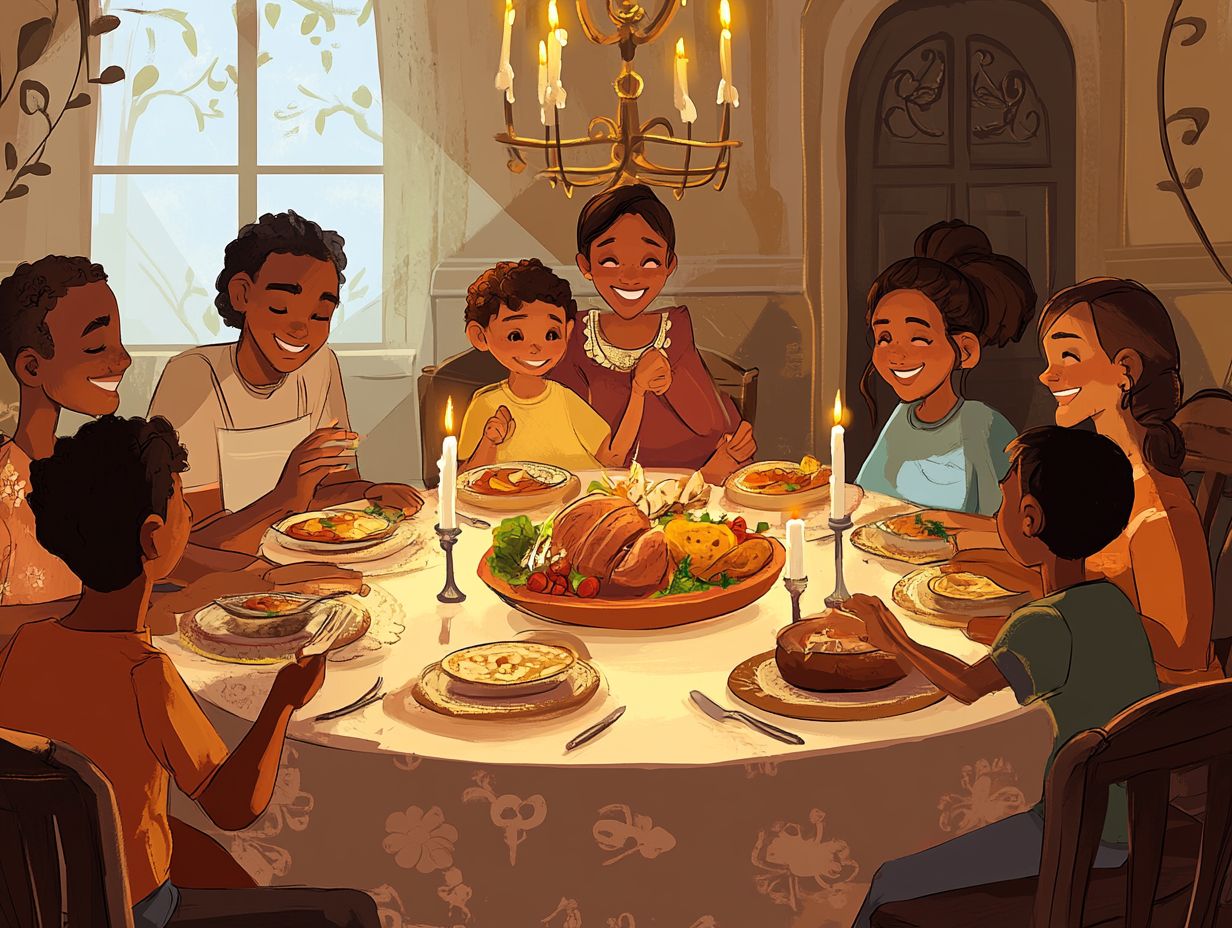
- Family rituals create stability and routine, providing a sense of comfort and security for family members.
- By scheduling regular time for rituals and making them personal and meaningful, family rituals can strengthen the bond between family members.
- Family rituals offer incredible benefits that can transform your family life, including improving communication and understanding, creating lasting memories, promoting overall well-being, and enhancing psychological health.
What Are Family Rituals?
Family rituals encompass the recurring practices and traditions that you and your loved ones engage in, serving to fortify the bonds among family members. These rituals can include a wide array of activities, from celebrating holidays like Christmas and Thanksgiving to everyday routines such as family dinners or bedtime stories. Special occasions such as birthdays and cultural festivals like Diwali and Halloween further enrich these traditions.
The true significance of family rituals lies in their ability to cultivate shared memories, reinforce core family values, and instill a sense of security and identity within your family unit, particularly during special occasions or unfamiliar circumstances.
Why Are Family Rituals Important?
Family rituals carry profound significance, serving as essential building blocks for nurturing strong relationships and enhancing the emotional well-being of each family member. Barbara H. Fiese from Syracuse University, who has extensively studied family rituals, emphasizes their role in promoting academic achievement and psychological health.
They cultivate a sense of belonging and continuity, which nurtures both individual and collective identity. In challenging times, such as during the COVID-19 pandemic or amid natural disasters like bushfires and floods, these rituals emerge as a stabilizing force, providing a predictable rhythm amid the chaos. The Journal of Family Psychology publishes numerous studies highlighting the crucial role of these rituals in reinforcing family bonds during such periods.
Family rituals offer families a vital framework for emotional connection, enabling the sharing of experiences and the creation of cherished memories that bring comfort and strength. The regular act of coming together not only fortifies emotional bonds but also bolsters resilience, enabling families to process stress and navigate difficulties with greater effectiveness.
How To Create Family Rituals?
Creating family rituals requires thoughtful planning and a genuine commitment to building connections among family members. By engaging in shared experiences and activities that align with everyone s common interests, such as Yum Cha outings or school drop-offs, you can cultivate a deeper sense of togetherness and belonging within your family.
1. Identify Values and Interests
The first step in establishing family rituals involves identifying the core values and shared interests among family members. These values and interests will serve as the foundation for meaningful activities. This can include family dinnertime, game nights, or celebrating cultural festivals like Ramadan and Thanksgiving.
This process begins with open discussions where everyone feels secure in expressing what matters most to them. You can create a welcoming space for dialogue by dedicating regular times to explore each other s passions and cherished values. Encouraging each member to share their preferences deepens understanding and cultivates a sense of unity.
Through these conversations, you can weave individual interests together. Ultimately, this leads to the creation of unique rituals that resonate with and celebrate your family’s collective identity.
2. Schedule Regular Time for Rituals
Scheduling regular family rituals is crucial for weaving these moments into the very fabric of family life. This enhances both bonding and tradition.
To truly enjoy this experience, consider designating specific days or times each week that everyone can commit to perhaps Friday nights for movie marathons or Sunday evenings for family dinners. By establishing a routine, each family member can eagerly look forward to these moments. This cultivates a sense of togetherness and stability.
These shared experiences bring your family closer together and lay the groundwork for open communication. This provides a comfortable space for everyone to express their thoughts and feelings. The delight of having consistent rituals can deepen your connections and create treasured memories that will bring smiles long into the future.
3. Make it Personal and Meaningful
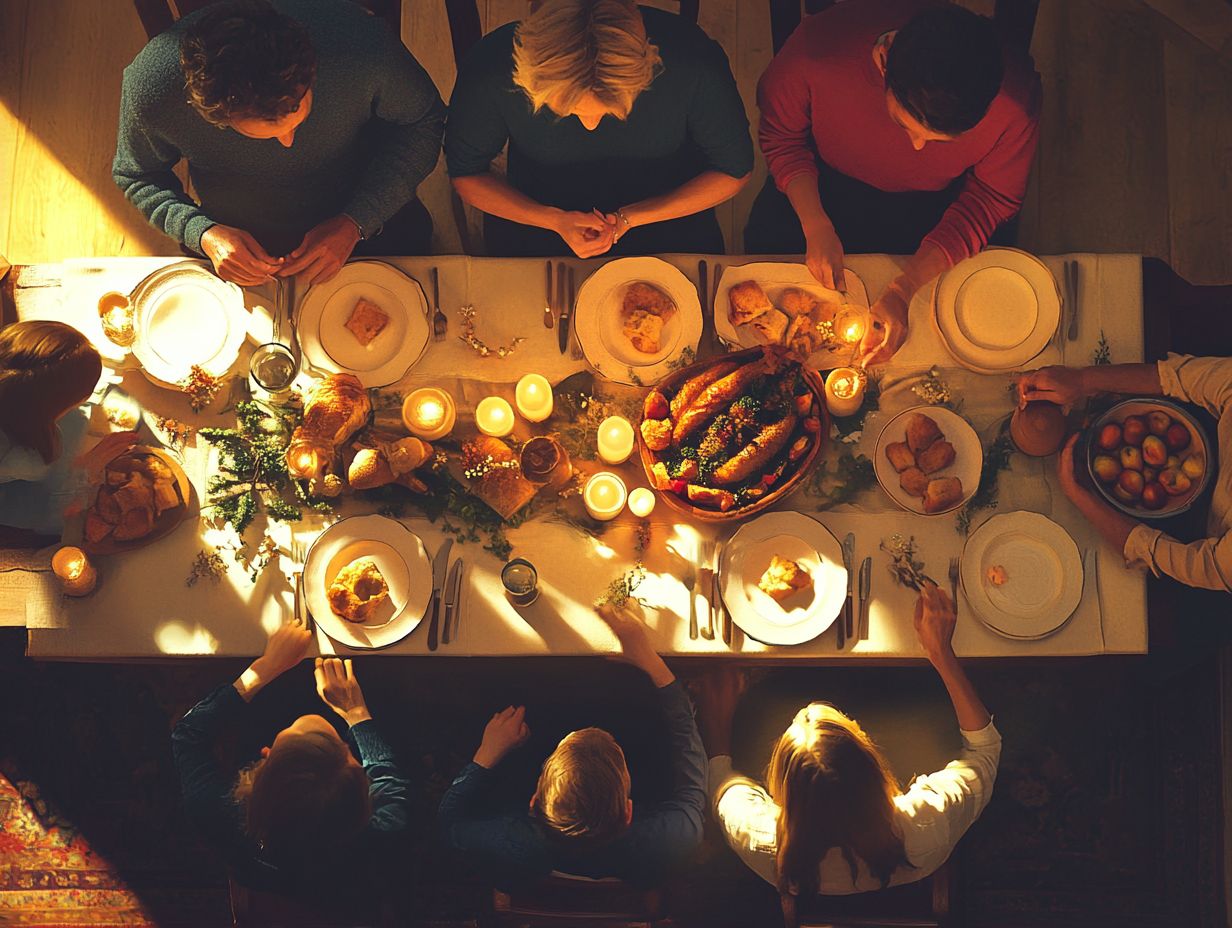
Making family rituals personal and meaningful significantly enhances their emotional impact. This creates opportunities for shared memories that deepen family bonds.
When you take the time to infuse unique themes into your game nights or introduce unconventional customs for holiday celebrations, you’re not just personalizing these experiences. You’re fostering an environment rich in creativity and connection.
These tailored rituals can evolve into cherished traditions that reflect your family’s values and interests. This ensures that each gathering feels exceptional and memorable. As you engage in these activities together, you’re nurturing deeper relationships filled with laughter, storytelling, and a profound sense of belonging. This positively influences everyone s emotional well-being.
Ultimately, these personalized touches weave a richer tapestry of family life. They cultivate a supportive and loving atmosphere that everyone can thrive in.
What Are Some Examples of Family Rituals?
You have a wealth of family rituals at your disposal. Each one is thoughtfully designed to nurture a sense of belonging and create shared experiences among your family members.
1. Family Meals
Family meals serve as a vital ritual. They foster bonding, communication, and create cherished memories among family members. Engaging in this practice allows you to step away from the whirlwind of your busy schedule. This creates a sense of togetherness that is often hard to find in today s fast-paced world.
According to the American Psychological Association, regular family meals are linked to better psychological health and stronger family relationships. At the dinner table, you ll find a vibrant space where children can hone their important communication skills. Everyone also has the chance to share their stories, joys, and challenges.
By making family meals a regular tradition, you not only reinforce these connections. You also create opportunities to celebrate your cultural heritage with a delightful array of dishes. Introducing recipes from various backgrounds can enrich your culinary experiences and nurture a deeper understanding and appreciation for one another’s traditions.
Creating Family Rituals
Family rituals play a vital role in strengthening bonds and enhancing emotional well-being. Here are some enjoyable traditions you can incorporate into your family life.
2. Game Nights
Game nights are an enriching family tradition that encourages interaction, teamwork, and laughter. They provide a wonderful opportunity to bond with your loved ones. Whether it s board games, card games, or strategy games, these activities create fun rituals that everyone can enjoy.
These evenings can be infused with a delightful array of board games and card games, ensuring there s something for everyone from strategy enthusiasts to those who thrive on luck. Engaging in these games not only sparks friendly competition but also nurtures essential communication skills, allowing family members to articulate their thoughts and ideas in a lively environment. Incorporating themes inspired by holidays like Christmas or Halloween can add an extra layer of enjoyment.
To elevate the experience, consider introducing themes inspired by a favorite movie or holiday, and perhaps even enticing prizes for the winners. This boosts the fun factor and motivates participation. Creating a fun atmosphere makes game nights unforgettable, transforming simple gatherings into treasured memories and strengthening family relationships.
3. Movie Nights
Movie nights offer a delightful family ritual, providing a perfect opportunity for you and your loved ones to spend quality time together while indulging in films that resonate with everyone. These moments contribute significantly to the emotional well-being of each family member.
To truly elevate these cinematic gatherings, it s vital to consider the diverse interests within your family. Selecting films that cater to a variety of tastes be it animation, action, drama, or documentaries ensures that each member feels included and valued. After the movie, diving into discussions can deepen connections, allowing family members to share their thoughts and feelings.
These shared experiences create lasting memories, showcasing the joy of family bonding through the enchanting power of storytelling.
4. Family Outings
Family outings serve as a remarkable opportunity to create fun traditions that break the monotony of daily life and reinforce the bonds that tie you and your loved ones through shared adventures. Celebrating cultural heritage by visiting museums or historical sites can also fortify family values and create enjoyable rituals.
By exploring various types of outings, you can uncover the joy of visiting local parks, where picnics and playful moments ignite cherished memories. Museums provide another enriching escape, giving you and your children a chance to learn together about history, art, and culture in a dynamic way.
Engaging in cultural festivals like Diwali, Halloween, Ramadan, or Christmas injects excitement and tradition into family life. These experiences allow you to create unique customs and stories that resonate through generations, weaving a beautiful tapestry of traditions that enrich your connections and celebrate your shared journey.
What Are The Benefits of Family Rituals?
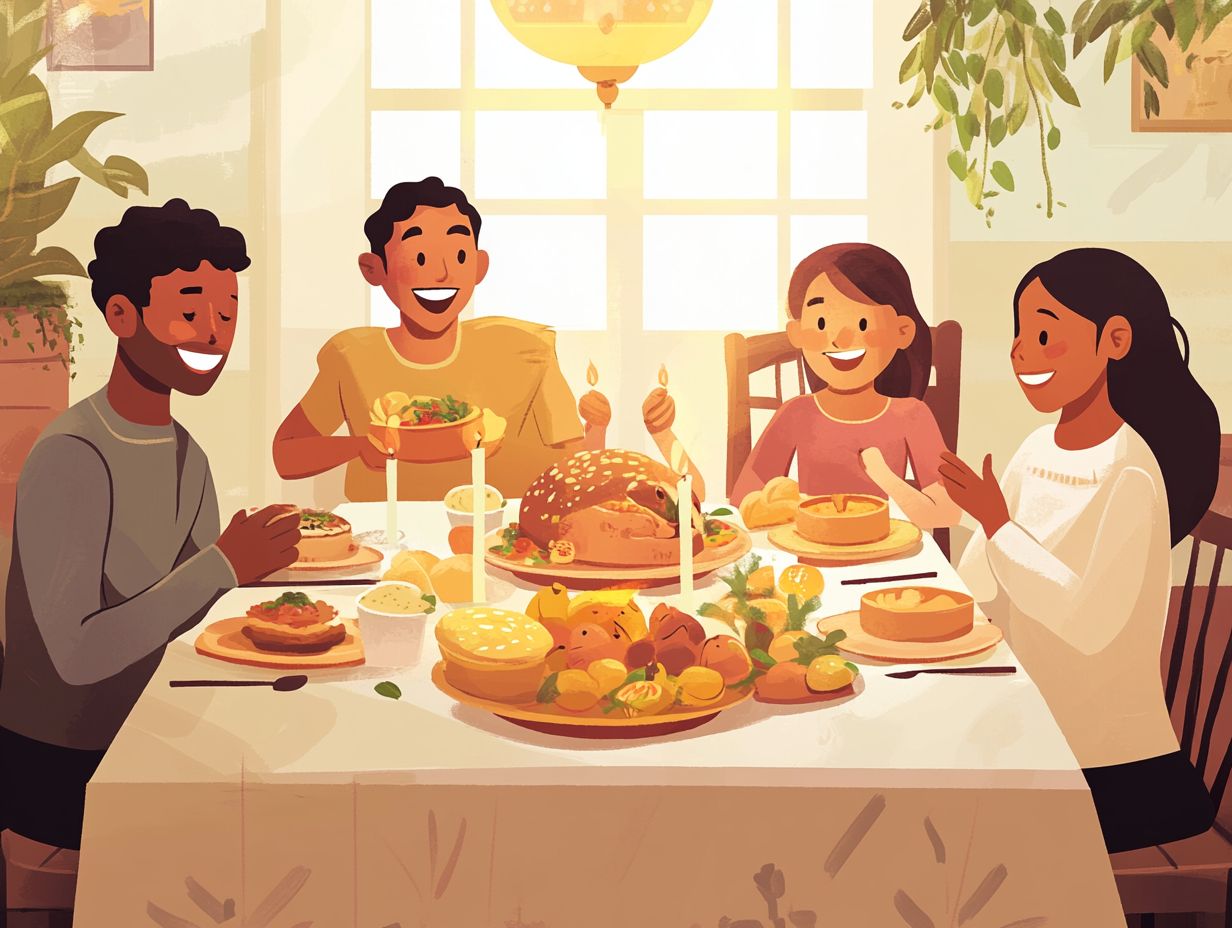
Family rituals provide more than just traditions; they play a crucial role in enhancing the emotional well-being of each family member while building closer relationships. According to Barbara H. Fiese, a professor at Syracuse University, regular family rituals help create a strong sense of family identity and connectedness.
1. Strengthens Family Bond
One of the primary benefits of family rituals is that they significantly strengthen your Family Bonds, enhancing the overall quality of your relationships. These experiences cultivate belonging and emotional support, creating a safe space for you and your loved ones to express thoughts and feelings freely. Research from the Journal of Family Psychology shows that family rituals foster emotional security.
Consider, for example, your weekly Family Game Nights or special Birthdays celebrations. They not only offer entertainment but also foster open communication, allowing everyone to share their victories and challenges in a relaxed atmosphere. Cooking a special meal together during holidays connects generations stories and traditions are passed down, reinforcing your Family Identity.
These activities ensure that each member feels valued and heard, ultimately leading to a more cohesive Family Unit. Celebrating occasions such as Thanksgiving enriches the family experience, contributing to a strong family identity.
2. Creates Lasting Memories
Family rituals create unforgettable memories that you and your loved ones will treasure! These shared experiences, whether a simple holiday gathering or an annual vacation, intricately weave the fabric of your family identity.
Over time, these moments evolve into stories brimming with laughter, lessons, and love tales that become staples at family gatherings, connecting generations in a profound way. Each ritual acts as a touchstone, igniting feelings of joy and nostalgia while reminding you of your roots and the shared values that define your family.
Research published by the American Psychological Association supports the importance of these rituals in creating lasting memories and a strong sense of family identity. The emotional weight of these memories nurtures a sense of belonging, enriching your family heritage. It ensures that future generations will inherit more than just stories; they will carry forward a vibrant tradition that enhances their lives in meaningful ways.
3. Improves Communication and Understanding
Don’t miss out family rituals can instantly elevate communication and understanding among family members! They offer a valuable platform for open dialogue and expression.
These rituals create a safe space where everyone feels at ease sharing their thoughts, feelings, and experiences, ultimately fostering a deeper connection. For instance, regular family dinners become an opportunity for you all to discuss daily challenges and triumphs, allowing each member to offer support and encouragement.
Establishing a designated family meeting each week encourages open discussions about any issues that may have arisen. This practice enhances problem-solving skills and emotional intelligence the ability to understand and manage emotions. These shared experiences not only nurture understanding but also cultivate a culture of empathy, where family members learn to actively listen and respond to one another with genuine care.
4. Provides a Sense of Stability and Routine
Family rituals serve as a powerful source of stability and routine, offering a comforting embrace during times of change or uncertainty. These practices create a sense of connectedness and safety, establishing a solid framework for navigating the emotional turbulence that often accompanies significant life events.
Whether it s moving to a new place, experiencing the loss of a loved one, or facing crises like the COVID-19 pandemic, engaging in regular activities be it shared meals, game nights, or cherished celebrations cultivates a rich environment that nurtures emotional well-being. Such rituals enhance resilience, facilitate the processing of feelings, and encourage meaningful conversations. Regular routines such as family meals and Yum Cha gatherings can provide a comforting structure.
In essence, these rituals act as grounding anchors amid chaos, providing both comfort and a profound sense of belonging.
Frequently Asked Questions
What are family rituals and why are they important?
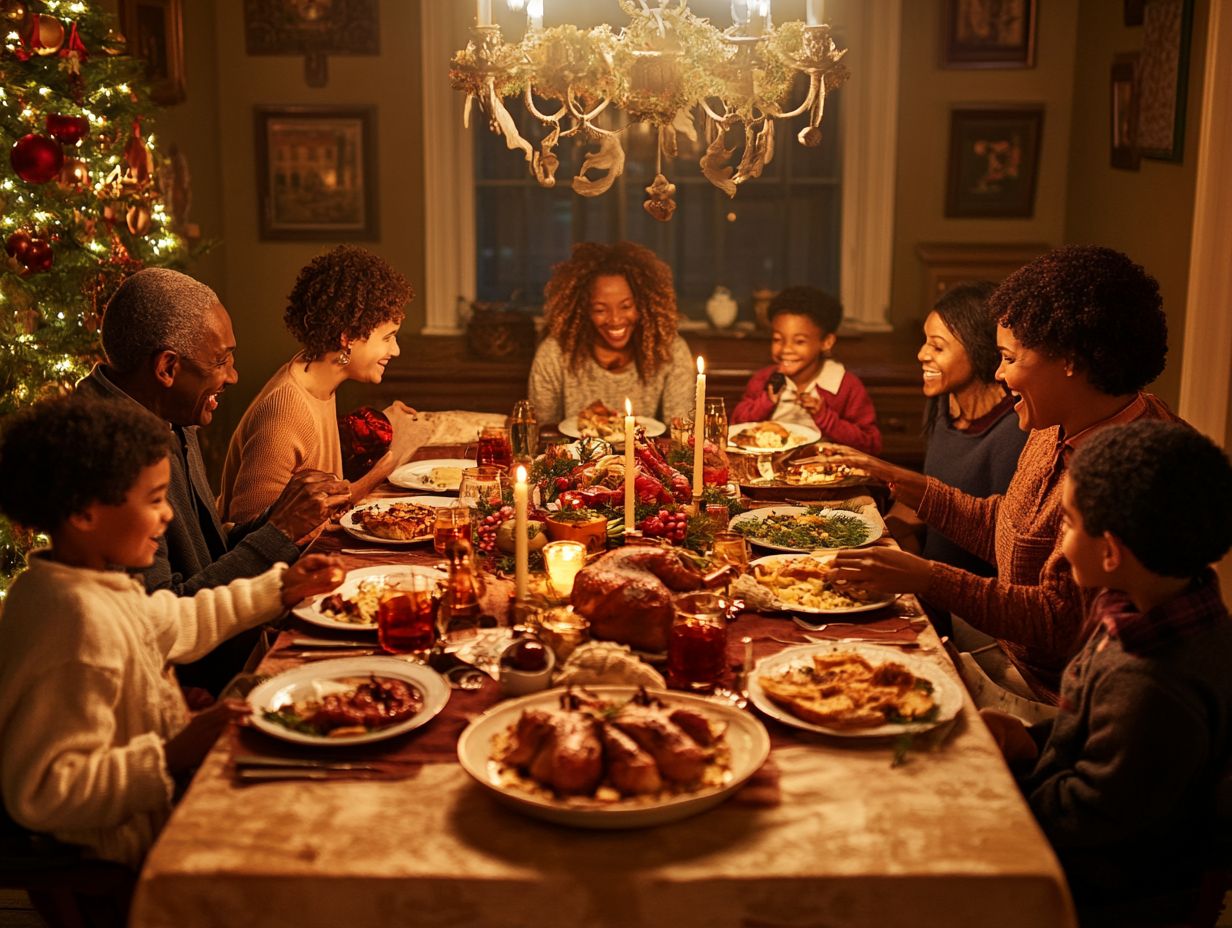
Family rituals are recurring actions or traditions that a family performs together. They are important. They help strengthen bonds between family members, create a sense of belonging, and provide stability and predictability for children.
Celebrations such as Christmas and Thanksgiving are prime examples of how these rituals can be integrated into family life.
How do family rituals benefit children?
Research has shown that family rituals positively impact children’s emotional and social development. They provide a sense of security and support, help children learn important values, and create lasting memories they can carry into adulthood.
Can family rituals help improve communication within the family?
Absolutely! Family rituals significantly boost communication within the family. When families engage in rituals, it creates a safe space for open and honest communication, leading to better understanding and stronger relationships between family members.
What are some examples of family rituals?
Some examples of family rituals include family meals, bedtime routines, holiday traditions, game or movie nights, and annual vacations. These rituals can be simple or elaborate, as long as they are meaningful and enjoyable for everyone.
How can families create and maintain rituals?
Families can create and maintain rituals by involving everyone in the planning process and being flexible and adaptable. It is important to make rituals a priority and to be consistent, even during busy or challenging times.
Families can also create new rituals as their dynamics and interests change.
Can family rituals help build resilience?
Yes, family rituals can help build resilience in children. Resilience means the ability to bounce back from challenges, and family rituals play a crucial role in helping children develop this trait.
They provide a sense of stability and routine, which can help children cope with stress and difficult situations. Family rituals create a sense of belonging and support, helping children develop a strong sense of self and confidence. During crises like the COVID-19 pandemic, the presence of regular family routines becomes even more crucial.

